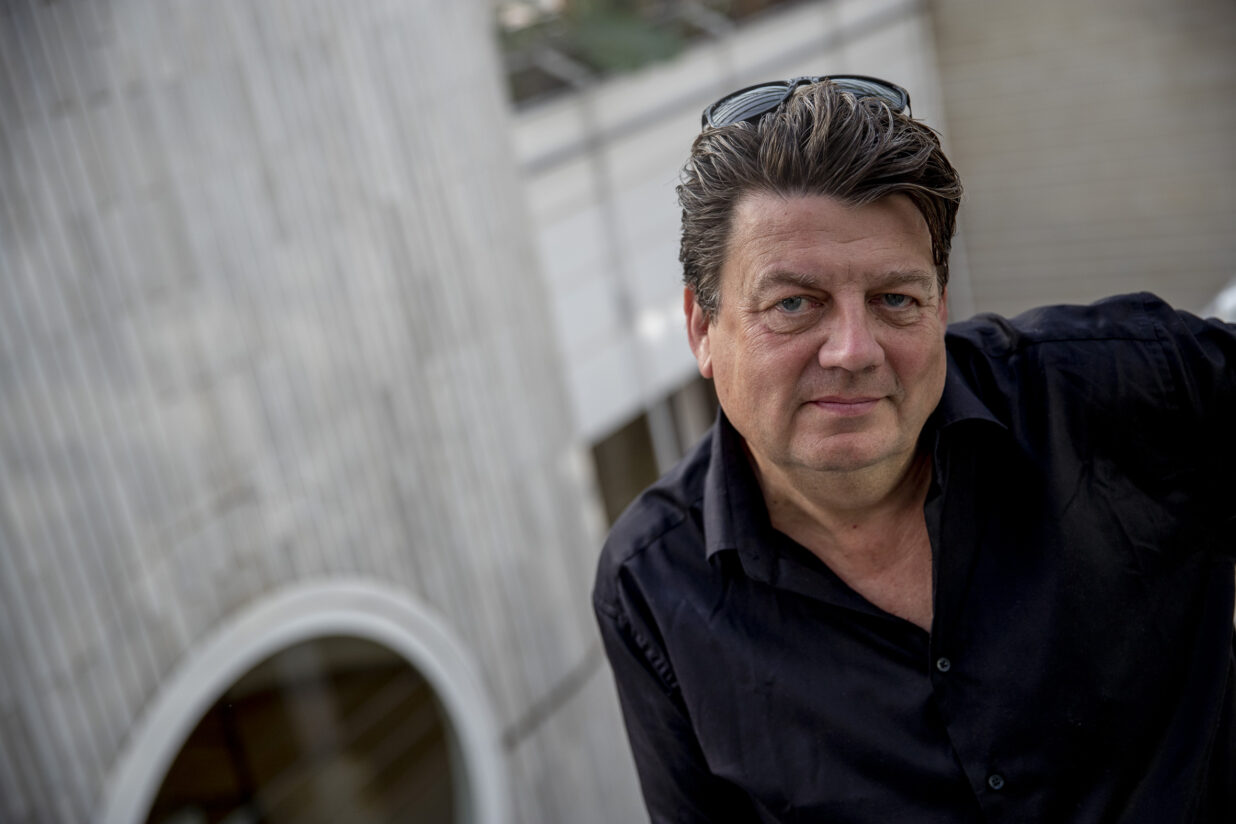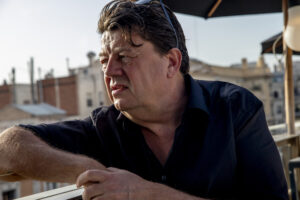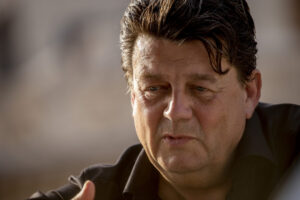07.11.2022 - 10:10
|
Actualització: 11.11.2022 - 12:36
Wolfgang Kaleck (Neuendettelsau, Germany, 1960) is key to understanding the success of the legal strategy of the exiled Catalan leaders. A prominent lawyer, Kaleck is known worldwide for his work denouncing human rights violations in countless conflicts over the course of several decades. He has had a big influence on Gonzalo Boye’s application of a concept which was largely unknown in Catalonia until recently: strategic litigation. This form of defence combines both a legal and political struggle in order to oppose abuses of power when upholding the law. Kaleck is extremely cautious, however, downplaying his role and choosing his words carefully when discussing the conflict between Catalonia and Spain, in spite of the crucial role he played at certain points. When pressed for details, he merely holds his tongue and smiles.
Kaleck was in Barcelona to promote the Spanish translation of one of his key works, Law Versus Power: Our Global Fight for Human Rights, in which he recounts in an autobiographical manner the most decisive cases he has been involved in, such as the lawsuits against those responsible for torture and the disappearances under the Argentinian dictatorship, or the case against Donald Rumsfeld for the use of torture in Guantanamo Bay and Abu Ghraib. Kaleck has paved the way for universal justice and the fight for human rights. And he continues to do so. He is currently Edward Snowden’s lawyer.
—What’s Snowden’s situation at present?
—You don’t need to be Snowden’s lawyer to appreciate that he’s in a tricky situation, thanks to the cowardly European countries and their double standards. This habit of celebrating enemy whistleblowers while punishing one’s own is disastrous. The growth in digital surveillance measures is so dangerous to all of our societies that the surveillers need to be surveilled.
—We need whistleblowers.
—It’s just that this can’t be achieved merely with good judges and politicians. We also need whistleblowers, people with courage who break rules and regulations, which they will need to justify later on -I don’t claim that being a whistleblower doesn’t mean you don’t have responsibilities, you must justify yourself. In Snowden’s case, when you discover violations of individual rights, citizen’s rights, human rights, and you do it with a certain spirit, not in the spirit of self-interest, there’s no way that this ought to be punished with a one thousand-year prison sentence in a top-security facility. It’s outrageous, and I’m really sorry that Snowden is now having to pay the price for the cowardice of European countries, like my own, Germany.
—Does the fact he’s in exile in Russia in the current context of the war in Ukraine make him feel uneasy?
—Of course. But I haven’t been able to meet up with him. First because of the pandemic and now because of the war, and I don’t know any more than you do. And I don’t want to discuss the situation, because it’s complicated. My job is to raise a stink about the attitude of the Western European countries, which make out they stand for democracy, but fail to act in cases like this.
—It must be even more complicated to do your job as Snowden’s lawyer at this time.
—Yes. At one time we hoped to find a way home for him. He has the advantage of being young, and the story isn’t over yet. So many things have happened in recent years that we hadn’t expected. Bad things, but also good stuff. I hope at some point we’ll find a way for him to come home, a solution that doesn’t involve punishment in the United States. The prison sentence they want to give him defies all legal logic. Thousands of years. It makes no sense at all.
—You fought against the crimes of the Argentinian dictatorship in accordance with the principle of universal justice when practically no one else was doing so. It was a learning experience. How did you go about it?
—It’s been a learning process right up until today. But I was able to do it because I had a progressive education and political training that included the idea of international solidarity. For me, from the beginning of my political involvement, it was important to fight at the local, regional level, but the struggles needed to be united and the idea of global justice needed to be developed.
—And how did those early experiences pan out?
—My first experience was in Guatemala. There we counted the missing and the murdered, and we tried to help the people who had lost colleagues, friends and relatives who had to go into exile. It was in the 1990s. At that time we had no prospect of justice or anything like that, it wasn’t even on our radar. About ten years later we got involved in the lawsuits in Argentina and Pinochet was arrested. And we saw that we could achieve things as lawyers, based on national law. We did so in the case of Argentina.
—And in Germany.
—A few Germans who knew nothing about the case, who didn’t even know where Argentina was, issued international arrest warrants against Videla and Massera. It was amazing. And they called for their extradition. And a few years later they appeared in court, stood trial and were convicted. It was a positive experience that really encouraged me. Then we decided to repeat the experience, and in the late nineties and early 2000s Madrid was the place to go. There were people there like Juan Garcés and Carlos Slepoy, the two exiled lawyers from Chile and Argentina, and off to one side Judge Garzón [Kaleck smiles and pauses briefly] with his image and his own background, of course. But the idea was clearly to universalize the Argentinian, Chilean and Spanish experience. I have to admit that it didn’t work, but neither did it fail.
—How do you mean?
—Between the nothing we had before and true justice, there’s a whole continuum. That, plus the first-hand experience I gained in Argentina and Chile. Direct and immediate action were important. And understanding that it wasn’t a football match, which you win or lose, but a political and legal struggle which all about moving forward.
—To keep going.
—Yes, maybe small steps, maybe big, including some small setbacks. You need to avoid major setbacks, of course. You have to take on risky cases, you need to accept the risk, but it mustn’t be a reckless risk.
—The important thing is to do it, more than anything else. It’s not so much about winning. That’s what you’re saying.
—Yes… [he laughs]. It’s a bit of an existentialist approach.
—You mean that it’s necessary to find the right path.
—Yes, but responsibly. I don’t want you to applaud me just because I do my job. Yes, sure, I come to Barcelona, we chat on this terrace, I drink a beer, people ask me what I do, and they tell me what a good job I do. Okay, I get it, but I’m not interested in applause simply for doing what we do; the really important thing is whether it makes sense, because this line of work isn’t about winning. Instead, we can move forward and we can universalize standards. That’s what it’s about. And we see it now in the case of Ukraine.
—Ukraine?
—Yes. The United States, which played a key role in international criminal justice after 1945, positioned itself more against it some time ago, in particular against the International Criminal Court. Now, however, together with the Western nations, they argue that Putin ought to be put on trial. What sort of a dual morality is that? It’s a double standard. It’s good that they’ve now acknowledged that war crimes, which are against the law, must be tried. We, as an organization, got involved in this fight, but not with the governments, but with Ukrainian NGOs, with the people on the ground. Meanwhile, this standard must be universalized, which is why we do not support a special international court for the war in Ukraine because we shouldn’t create special laws and courts.
—Wouldn’t a special court be useful?
—We need to make these standards universal, so that they apply to every conflict that occurs in the world. Many countries in the South also say ‘look, now that the Europeans have seen war at first hand, they realize what it means’. Prior to that, we used to look at it from the outside; now we’re asking ourselves what makes it possible for there to be a war, the arms trade and financial backers, for example. In other words, if you argue against the companies that have armed the Russians, then you ought to do the same with those that export weapons to Saudi Arabia for the war in Yemen, where there are even more fatalities.
—The idea is that universal standards for trying those responsible for war apply everywhere.
—And that they include transnational companies.
—It’s one of the fundamental parts of your work: that it should apply all over the world, at all times.
—Exactly.
—You work with Ukrainian civil society. Did they approach you for help?
—We were already in contact before 24 February because we are one of the main players in Europe in this type of litigation. A couple of weeks ago we had a meeting in Berlin with NGOs working in Ukraine, who are local. With the experience I gained in Argentina, with such a strong human rights movement, it’s clear that they have to develop their own vision, their own strategies, and we can contribute to that. They’re different kinds of cases, but there are courts in Ukraine, there’s the possibility of pursuing a case there, and we have to see how the interaction between courts in Ukraine works with the International Criminal Court and cases of universal jurisdiction in countries like Germany. We talked about all this, as we have done in other cases with colleagues from Syria, Belarus, Sri Lanka, Colombia and so on.
—Speaking of double standards: Argentina is dealing with its dictatorship, and you’re well aware that Spain isn’t. How do you explain the difference?
—Baltasar Garzón was a witness to what happened. At the end of the 1990s, many people, including the left in Argentina and Chile, were enthusiastic about the case against Pinochet. But there were people who were questioning how the colonizers had the gall to judge them. There was a certain feeling of “Let’s show the barbarians in the South how justice is done.” Some asked, and they had a valid point, “What do we do with the transnational companies that supported the dictatorships?” And this explains our case against Mercedes-Benz in Argentina. The dictatorship, both in Chile and in Argentina, had the objective of strengthening the neoliberal model, and in order to do this they had to destroy the labour movement and the left-wing government and the unions. Multinationals such as Ford and Mercedes-Benz were complicit in this. And there was one main point of criticism: why don’t they do justice to their own past? And it’s hard to understand, really, because in the Spanish case we’re not talking about hundreds of dead and missing, we’re talking about decades of crimes against humanity.
—And Garzón’s role, and his responsibility in other cases.
—He was heavily criticized at the time because he intervened in many cases that were not in line with those who supported Pinochet’s arrest. But he himself, a few years later, took on cases investigating the crimes of the Franco regime, and the truth is that they got rid of him for that reason. It’s really shocking. Seen from the outside, the fact that it happened was highly significant, as it was a test of the rule of law in Spain, which it failed. It totally flunked the test. That is a terrible shame, since I come from a country that has committed crimes of a magnitude that is difficult to match. I wouldn’t want to draw any parallels.
—But there were trials in Germany.
—The criminals responsible have been put on trial right up until the present day. Ninety-year-olds have stood trial. But it’s not so much about what sentence they receive, or whether they’re sent to prison; it’s about finding out what happened, doing research that brings us closer to the truth, and at the same time making some kind of reparations to the surviving victims. In the aftermath of WWII, the military, the secret services, judges, prosecutors, law professors and prominent doctors built a career out of Nazism and committed crimes with impunity. And the court cases we have now allow us to find out what happened. Just this week I read a two-page article about how SS criminals continued to serve in the [German] secret service after the war. It’s incredibly important that a society takes responsibility for what happened and I’m terribly sorry that this doesn’t happen in Spain.
—Perhaps it’s because in Spain there’s been continuity with the Franco regime, especially in certain areas such as its economic and judicial institutions.
—Without a doubt. There was also this continuity in Germany, but the war had victors, the allies, and this in itself meant a break with the past. And the West German constitution of 1949 was more or less democratic. But we needed a second break with the past, which was to be the student movement of 1968. The judiciary in Germany was dominated by older people, they were everywhere: judges, prosecutors, lawyers, with their books which for decades after the war included the names of the great jurists of Nazism. And from 1968 this began to change. Two much-needed breaks with the past, which Spain didn’t seem to have.
—In Spain, the president of the judiciary publicly invoked Carl Schmitt just two years ago.
—Ha, ha! Carl Schmitt is something else. Yes, he was an accomplice to Nazism, but the part of his work before 1933 is even more interesting. Because he trained generations of authoritarian jurists, and then there was his anti-Semitism and his legitimization of Hitler. I think his work before 1933 is even more dangerous, though it’s not as obvious as his anti-Semitism.
—You mean his friend-enemy distinction?
—Exactly. Because he says that a state can only survive if it has clearly defined who its enemies are.
—It’s what’s happened in Catalonia as a reaction against the pro-independence movement, to suppress it.
—Yes. And it’s not surprising. Because Schmitt’s work is part of the rationale used by the police and governments. And the most notorious example is the enemy criminal law.
—Are you aware of how it’s been applied in Catalonia?
—More or less, from the outside. But I know about it, of course. Four years ago, I was commissioned by ERC to write a legal report, together with two former judges of the European Court of Human Rights. We didn’t go into the question of sovereignty, but rather the crackdown which ensued, which for us was clearly a violation of the rights of freedom of expression and freedom of assembly and protest. It was a disproportionate act of state power.
—You’ve also heard about the situation from Gonzalo Boye, who’s a good friend of yours.
—Yes. But that’s something else. Many people see him as the enemy now, since he’s involved in many matters which are…
—Sensitive?
—Sensitive, yes [he laughs].
—And he’s paying a high price for it.
—Gonzalo Boye is a lawyer who collaborates with our organization. And when they started taking steps against him, we sent a report to the Special Rapporteur on the independence of judges and lawyers to complain about it, including a list of violations of his rights as a lawyer. The thing is, there’s a lack of a culture involving the practice of law, because you have to distinguish between the lawyer’s role and that of his or her clients: a lawyer has the right to speak in public, to represent their client with all legal safeguards, and a lawyer must not be penalised for this.
—Well, he has been penalised alright. They also used Pegasus spyware on him when he was carrying out his work as a lawyer.
—There is one thing I used to believe, even before Snowden’s revelations, and I continue to believe it now: if you give the police and secret services of the world these tools and technical means, there’s a danger that they’ll use them. And legal oversight never keeps up with technical development, which is incredibly fast and dynamic, and that’s a recipe for disaster. In the past, dictators didn’t have access to this technology. But now you see how China has them and they’ve pretty much perfected them. Now everyone is complaining: Xi Jinping, what a dictator! What an abuse of power! But the part that’s most worrying is digital surveillance. The worst examples need to be studied, and for me this is the worst case of all.
—What’s happening in China?
—Yes, look at how they handled the pandemic. It’s a dystopia, and I see no end to it.
—They took advantage of the pandemic.
—In the summer of 2020, at the start of the pandemic, Snowden and I spoke about how states were taking advantage of any opportunity to gain more power, to invent new techniques of control and justify them with other arguments. And I don’t deny the dangers of the pandemic, I don’t. But boosting these surveillance measures, especially in the health system, brings a permanent danger for the future.
—But Spain started spying with Pegasus before the pandemic, and this reveals a police state which keeps an entire political movement, such as Catalonia’s independence supporters, under surveillance.
—Yes. And I want to say that in order to face this danger, you need politicians, parliaments and a legal system which are aware of it, whose eyes are peeled, and that surveil the surveillers. But I don’t see that happening and I’m looking forward to discussing it in depth with Gonzalo Boye.
—Did you collaborate with Boye in the defence of the Catalans in exile?
—Well, he said something about it in his book.
—Which is why I bring it up.
—Well, I’ll say I didn’t [smiles]. If Boye claims otherwise, fine.
—What else are you working on at the moment?
—I’m the General Secretary of the European Center for Human and Constitutional Rights (ECCHR). It may not be as gripping as what I talk about in the book, but I prefer not to compare it to the value of the work I was doing back then, getting personally involved. The way I got into this line of work in Argentina was spectacular in many ways, a very emotional, very valid experience, I freed myself from the ego of the left-wing German lawyer. Working with human rights and transnational cases, I realized that it was incredibly important to establish an independent structure which didn’t depend on a single individual. And this doesn’t fit the model of the heroic, male, left-wing lawyer. There are many such people, and they do very important work. But the work seems much more sustainable to me, if we can exchange experiences with others.
—Why did you write this book about your experiences as a “heroic lawyer”?
—Jennifer Robinson, an Australian lawyer, told me that they needed other models of lawyers. It was the main motive. You see, when I started out I had no idea what would come out of it all, and I think it’s really important to have certain models, certain guidance, at the same time as you’re having your own experiences, finding your own path.
—You tell a story, a kind of journey of initiation, in which you distance yourself from this label of heroic, committed, warrior lawyer, after having gone through such brutal experiences as the lawsuits in Argentina and the case against Donald Rumsfeld, till you get to a point where you are working more as part of a team.
—Explicitly political teamwork. There are two pillars: the Amnesty International and Human Rights Watch model, who say that human rights are neutral, that they mustn’t look like a left-wing organization or take a political stance, as this will benefit them. They need to appear neutral and apolitical because these are simply human rights.
—And it shouldn’t be like that.
—It shouldn’t. Because the powerful don’t want to wield their power brutally and directly, but to exercise more subtle violence, to exercise power more subtly, using laws and lawyers. Lawyers afford you legitimacy, cover, and that’s what needs to be deconstructed. The struggle for justice and human rights is clearly a political and legal fight, that much ought to be clear. We, as an organization, aim to use the law, and our legal experience is at the heart of our work. It’s not about carrying out symbolic actions: what we do is serious, we prepare it professionally. But this is only one part of the struggle for human rights. The other part is political.
—You simultaneously engage in a political and a legal struggle.
—That’s right. And this doesn’t mean that Amnesty’s strategy, for example, is wrong. I mean that it needs to be complemented by other efforts. It’s part of the job and everyone has their role, they do their share of the work. I contradict the typical image of the fight for human rights, but also the work of the lawyer, as it’s not at all neutral or apolitical. Instead, it’s incredibly interesting, politically speaking. And in our court cases, there are parts of the job in which our work has a very strong legal basis. Our job is to prove abuses of existing laws, but it is likely that other laws will be needed, and that means it’s a political issue.
—It’s about using the law against the power structure so that the power structure ends up changing the law.
—Yes. But power exists in every relationship in society and in every relationship between individuals and groups, and I don’t want to oversimplify it. We, too, are part of the power structure, but we can use the laws in favour of the world’s marginalized people. This is something new, especially if we look at the countries in the South, where there are networks of lawyers working for NGOs, many of them staffed by young people, who work hand in hand with social movements and frontline activists.







